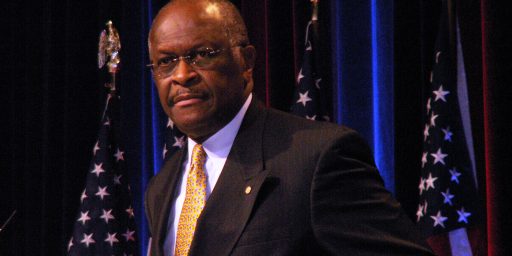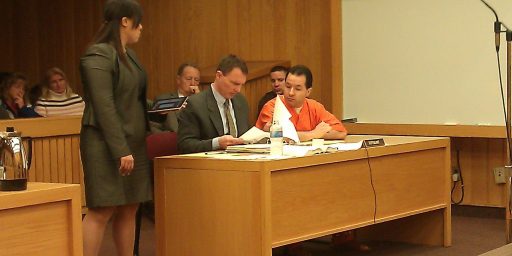TRIBUNALS
Kevin Drum links an Economist story comparing military tribunals and other courts. Since it’s unavailable-to-nonsubscribers and they want $19.95 a month to subscribe, I’ll remain in the dark, I guess.
Still, the chart which Kevin provides is not too flattering. Now, granted, putting “civil judge” atop the list is a bit misleading since military tribunals by definition lack these. And one can even understand some limitations on discovery, given the nature of classified information. But the lack of juries, lawyer-client confidentiality, and right to appeal are worrisome. Indeed, these are all available in military proceedings under the UCMJ. One wonders why the Administration would risk this PR hit when the war on terrorism could be waged successfully under the normal rules.
Matthew posts a link to a free article on the subject in the comments.






James, I think there’s a very real question about the grounds on which the detainees deserve the legal rights outlined in the Economist chart. A separate article appears to review several of the themes of the premium article. While I believe that the combatants who are British and Australian citizens should be returned to those countries and put on trial with close US cooperation/supervision, I do not believe that the enemy combatants from Afghanistan, Saudi Arabia, Pakistan, Yemen, and elsewhere can be extradited, for obvious reasons, and I do not feel that precedent exists for putting these men on trial in anything resembling a civil court.
How, for example, is a jury to to be appointed? (The defendants most certainly cannot be given a jury of their peers.) How about lawyers — how are these men in limbo to choose their own defense? If we put them on trial in American courts, a whole different set of civil liberties complaints would arise, much as they did during the first WTC bombing cases, and much as they’ve arisen in the domestic terrorism trials.
The only thing I can think of is to create a special court for the purposes of trying the men. But such courts are only useful in “victor’s justice”-type situations; i.e. after a nation has been defeated or a faction has been subjugated. The Special Court for Sierra Leone, for example, put men on trial for crimes that already happened rather than charge them with participation in an ongoing conspiracy to commit criminal acts. I think the jury is still out (pun not intended) on whether or not an international legal body can adequately cooperate with the war on terror.
Matthew,
I think it depends who they are. Part of it is the boneheaded PR move of declaring a US citizen an enemy combatant even though he was caught here. I don’t mind it with the likes of Walker-Lind, since he was captured in a foreign war zone.
People who are prisoners of war generally don’t get put on trial. If we’re calling them war criminals, they generally do get some basic protections. Even the guys at Nuremberg did.
I believe that, eventually, that all of the American citizens caught overseas will be tried in American courts for treason and related offenses. Likewise, I’d support sending the British and Australian citizens to those countries for prosecution. I’m in favor of guaranteeing these guys a fair trial and ensuring that innocent men not get railroaded, so maybe I’d prefer a Nuremberg-style setting for the rest of the detainees to the present format.
However, many of the arguments from analogy used to attack the president about these detainees are faulty. They’re not POWs and they’re not American citizens, but Kevin Drum and others on the left are treating them as such. Everyone needs to step back from the partisan fray and think about the fact that these fellows are a completely different class of combatant than we’re used to dealing with.
Matthew,
The status of a lot of these folks is rather murky. We’re treating them as unpriviledged belligerents, the equivalent of spies, because they weren’t fighting as part of a uniformed army. I think that’s technically right but I’m a little queasy about it. I can understand not granting full POW status in the sense of prisoner exchange, but otherwise I’m not sure how we can justify this. And, given our comparatively better justice system, I’d hate to see this reversed for Americans caught in other countries.
James, I think the best analogy to describe the detainees is to liken them to pirates. They aren’t war criminals, because their actions (by and large) weren’t part of a war in the legal sense. Furthermore, the war criminal designation requires them to have participated in some kind of military order tied to a state — and Taliban-controlled Afghanistan was not a state by traditional definitions of the term. Similarly, they aren’t POWs, because, as I posted in Kevin’s comments, the Geneva Convention and other statutes covering POWs are agreements between states, and Al Qaeda is not a state.
Instead, the detainees have extralegal status because the political entity they fought on behalf of — like pirate bands — is not recognized by the international community. The situation is murky, as you say, and if anything, the detainees require us to create a new legal approach. The Bush administration’s current policies in this matter don’t please me, but I haven’t heard a single good alternative proposed. All I hear is “Bush = evil,” which isn’t a policy.
I have almost no knowledge of maritime law, let alone the status of pirates. One would think they would be treated as simple criminals, no?
I grant that the Taliban regime wasn’t recognized by very many states, but Afghanistan is a state and the Taliban was running it. The Confederate States of America wasn’t recognized by much of the international community, either, but its prisoners were treated by the rather shoddy norms of the day as POWs.
If they’re not considered military personnel, then they would be terrorists, i.e., criminals. Don’t we generally try terrorists according to normal rules of procedure?
This isn’t a “Bush=evil” argument but rather a “Bush is screwing this up” argument. These people, unless they’re charged with some specific crime, should be treated like POWs. Why not? It is good PR to do so and has no down side. We’re not torturing them. The war isn’t over, so we don’t have to release them. If they’re going to be charged with crimes, give them the basic protections afforded in the UCMJ. We routinely make exceptions and accomodations on national security grounds when classified information is involved.
—